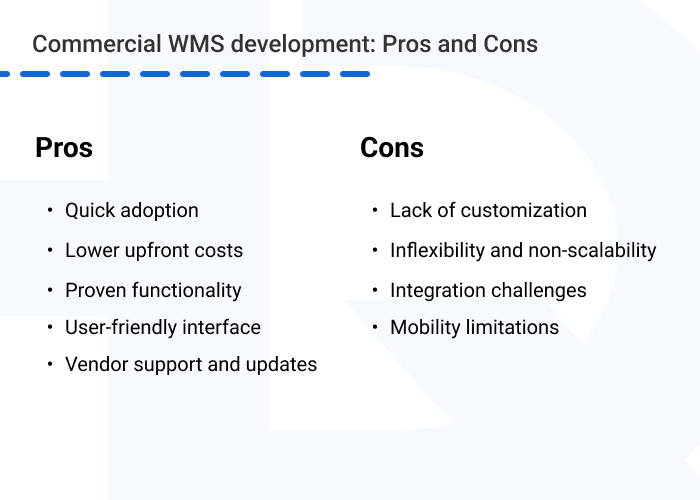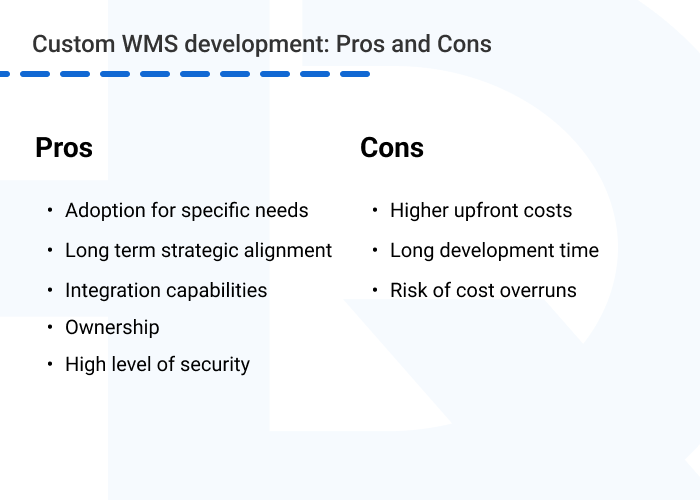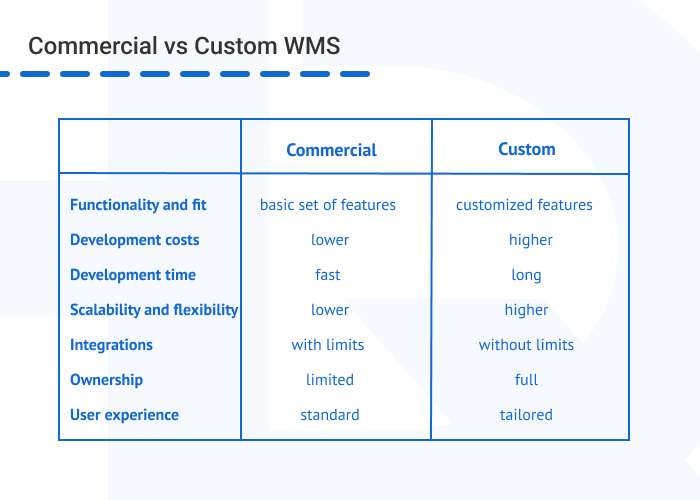To Build or Buy a WMS? Consider These Factors
Commercial Warehouse Management Systems
Custom Warehouse Management Systems
Custom WMS vs Commercial WMS: Head-to-Head Comparison
The main concerns in choosing between a custom and a commercial WMS are often about what level of customization is needed, relative cost, and the time involved. The final choice should be made with regard to your organization’s specific requirements, budget, and timeline.
In this guide, we will delve into the main differences between custom and commercial WMS solutions, to help you decide which one is right for you.
To Build or Buy a WMS? Consider These Factors
Commercial Warehouse Management Systems
Custom Warehouse Management Systems
Custom WMS vs Commercial WMS: Head-to-Head Comparison
Deciding whether to build or buy a WMS requires careful consideration of several critical factors:
Considering these crucial aspects can help you make an informed decision that aligns with your warehouse management strategy. Now, let’s take a closer look at the pros and cons of each type of system, to gain a clearer understanding which option might suit your requirements better.
Commercial WMS provides a basic set of features to efficiently handle inventory, order fulfillment, labor management, and other critical warehouse management tasks. With ready-made solutions, you can choose between cloud-based—which provides remote access to the system—and local, installed at the organization’s site.

Advantages of commercial WMS include:
Now, let’s consider drawbacks to a commercial WMS:
If your business has limited resources and needs to align with standard functionalities, commercial WMS solutions may be a simpler option. However, with their scalability and flexibility limitations, a custom WMS may be a better alternative.
A custom warehouse management system is specifically developed to meet the unique requirements of a particular organization’s warehouse operations. Using a custom WMS, you can simplify and automate all aspects of warehouse management, such as inventory control, order fulfillment, receiving, picking, packing, shipping, and reporting.
Another benefit of a custom WMS is its ability to add enhanced functionality, such as demand forecasting, advanced inventory navigation, and marketplace synchronization, which can help double your warehouse efficiency and eliminate the possibility of human errors. However, like any technology, customized systems have their pros and cons.

Advantages of a custom WMS include:
Want to create a custom WMS solution? We’re ready to help!HQSoftware has a team of skilled professionals ready to tackle the project. Let’s talk!
Anna Halias
Business Development Manager
The benefits of a custom WMS mentioned above are just the tip of the iceberg; there are many other advantages that we’ve described in detail in a separate article. However, it’s important to consider the potential drawbacks associated with custom WMS development and implementation.
Disadvantages of a custom WMS:
In general, custom WMS solutions allow you to address your specific challenges and leverage competitive advantages within your particular business sector. Careful planning, close engagement with an experienced development team, and a thorough understanding of your specific needs will help you achieve the best result.
But before deciding which type of WMS suits you best, let’s consider the core differences between custom and commercial solutions.
As described earlier, both options have their advantages and disadvantages, which means you’ll need to carefully evaluate your needs and resources. Here are the key differences between a сustom and a сommercial WMS.

A commercial WMS is a pre-built solution that offers a set of standard features such as order fulfillment, stock level control, picking and packing. Commercial solutions are designed to cater to a wide range of industries but have predefined capabilities.
A custom WMS is built specifically for your organization, allowing you to tailor the system to meet your unique business processes, workflows, and requirements. Besides the core functionalities, it provides fully automated warehouse processes, in-depth data analysis, advanced reporting, and intuitive dashboards to investigate your warehouse performance.
A commercial WMS allows basic warehouse workflows and operational models, but has limitations in terms of scalability.
A custom WMS can be designed to scale and adapt as your business grows. It offers the flexibility to add new features and internal and external enterprise systems integrations to meet changing market requirements. In addition, custom solutions can be designed to easily incorporate new algorithms and emerging technologies, such as AI, ML, and IoT.
A commercial WMS uses standard APIs and provides pre-built integrations with third-party systems. Any custom integrations incur additional costs.
A custom WMS seamlessly integrates with any external or internal enterprise system, such as ERP, CRM, or transportation management systems, ensuring smooth data exchange and end-to-end visibility.
With a commercial WMS, you rely on the vendor for ongoing support, maintenance, and updates. While this eliminates worry about renewals, you may have limited control over the system’s development and future enhancements.
By developing a custom WMS, you have complete ownership and control over the system. You can make changes and updates as needed without relying on external vendors. Additionally, to protect sensitive information and avoid data leakage, you can install any security measures you need.
Acquiring a commercial WMS involves licensing or subscription fees, which can be more cost-effective initially. Also, a boxed WMS can offer faster implementation, as the system is already available for deployment.
Building a custom WMS is more time-consuming. Since you build the system from the ground up, you will have to go through the entire product development cycle, from requirements collecting and analysis to deployment and staff training. On the other hand, a custom WMS is cost-effective in the long run because of its long-term scalability and reusability.
A commercial WMS is designed with intuitive interfaces, standardized layouts, and familiar design patterns for a set of core processes and workflows.
In turn, a custom WMS’s UI can be specifically designed to match your organization’s preferences, workflows, and branding. This customization can result in a more cohesive and familiar user experience for employees.
Overall, while off-the-shelf systems have many limitations that lock you within a typical system, a custom WMS provides freedom, allowing you to create a unique solution and become a market leader.
By building a custom WMS, you may benefit from :
As an example, at HQSoftware we have developed a custom e-3PL system that allows automating and streamlining of most warehouse operations. Using the system, our client can automatically manage inventory, simplify product audits using configurable system criteria, and automatically update product information on a variety of platforms, including marketplaces.
In addition, the WMS provides automatic navigation to create optimal picking routes within the warehouse and determines the quantity of goods to reorder using a demand forecasting feature. By analyzing historical data, the system can calculate when goods are close to running out and order the necessary amount, displaying all this information in the calendar dashboard. With this enhanced functionality, our client was able to avoid overstock and reduce expenses.
As a result, this customized WMS helped our client decrease order collection by 25% and improve order fulfillment by 99%.
Implementing a custom WMS is a time-consuming procedure that requires assembling a high-skilled team. Moreover, the software development must be secure and efficient enough to handle common implementation challenges; otherwise, it will fail. While you can spend resources on in-house development, working with an outsourcing company that possesses deep domain expertise will be quicker and more effective.
Specialists at HQSoftware can design any kind of WMS project, based on a thorough analysis of your organization’s existing workflows, business rules, and strategic objectives. That analysis enables us to build a high-quality solution with an optimal combination of WMS features, upgrading the system with AI and ML technologies.
At HQSoftware, we offer a variety of WMS development services:
By the end of the project, you will receive a fully customized WMS that is designed to improve your warehouse ROI through optimized operations and warehouse management.
Ultimately, to make an informed decision that aligns with your company’s resources, remember to assess the benefits and drawbacks of each system.
A commercial WMS is the perfect solution for businesses that need to manage only typical warehouse processes. Whereas a custom WMS, with its flexible architecture, forecast capabilities, and strong security measures, can become your business’s primary tool for effective warehouse management.
Nevertheless, if you find the technical aspects of custom development difficult to get your head around, or if you’re unsure whether you have the required resources, feel free to get in touch with us! Experts at HQSoftware can help you make a thorough cost-benefit analysis, choose the optimal development approach, and offer the best-in-class software engineers.

Head of Production
To ensure the outstanding quality of HQSoftware’s solutions and services, I took the position of Head of Production and manager of the Quality Assurance department. Turn to me with any questions regarding our tech expertise.
We are open to seeing your business needs and determining the best solution. Complete this form, and receive a free personalized proposal from your dedicated manager.

Sergei Vardomatski
Founder